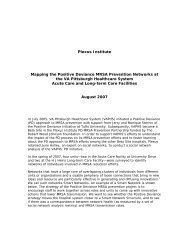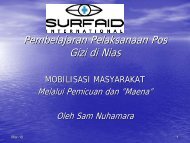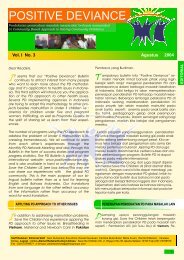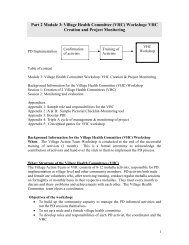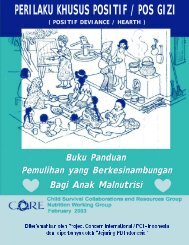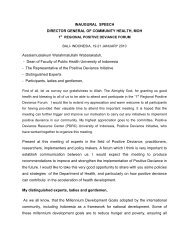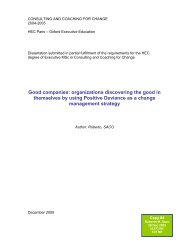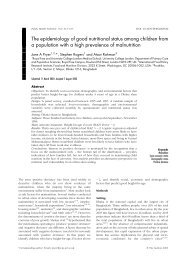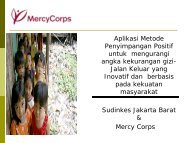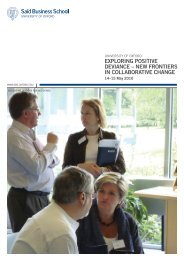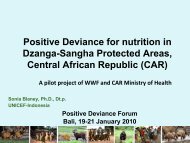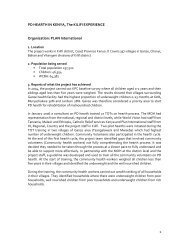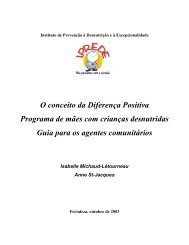F&N Bulletin Vol 23 No 1b - United Nations University
F&N Bulletin Vol 23 No 1b - United Nations University
F&N Bulletin Vol 23 No 1b - United Nations University
You also want an ePaper? Increase the reach of your titles
YUMPU automatically turns print PDFs into web optimized ePapers that Google loves.
78<br />
N. Omidvar et al.<br />
of sensitivity, than a targeted intake assessment similarly<br />
validated among preschool children in rural<br />
Thailand [7]. Infection was more likely to influence<br />
serum retinol levels among the Thai children than<br />
in the present sample, whereas intake per se is more<br />
important in the present sample of Iranian women.<br />
Discussion<br />
The purpose of this pilot study was to design and<br />
validate a short food-frequency questionnaire for<br />
screening women’s vitamin A status. A 20-item short<br />
food-frequency questionnaire was developed. Validity<br />
and reliability tests indicate that the questionnaire is<br />
relatively valid and reliable for the purpose of identifying<br />
women at risk for vitamin A deficiency as indexed<br />
by serum retinol level. The correlation between short<br />
food-frequency questionnaire estimates of dietary<br />
vitamin A intake and serum concentration of retinol is<br />
similar to that reported for children [6, 13, 14] and for<br />
pregnant and lactating women [17]. These findings<br />
stand in contrast to observations in populations of<br />
vitamin A-sufficient adults in which no correlations<br />
or only weak relationships between serum retinol and<br />
intake were found [18–20].<br />
The findings of the present study indicate a lack<br />
of correlation between estimates of vitamin A intake<br />
by recall over a 48-hour period and serum retinol<br />
concentrations. This observation is consistent with<br />
previous studies demonstrating higher reliability of<br />
intake estimation by food-frequency questionnaire<br />
than that by 24-hour recall with respect to vitamin A<br />
status. Serum vitamin A levels are a function of longterm<br />
intake of vitamin A-containing foods. Therefore,<br />
short-term measurement of vitamin A intake is subject<br />
to fluctuation and does not reflect the risk of<br />
deficiency.<br />
Two items rather specific to this population emerged<br />
from this analysis. The most striking is the importance<br />
of nuts in the diet. Although nuts are relatively low in<br />
provitamin A, their regular intake by the study subjects<br />
makes their contribution to vitamin A intake significant.<br />
The second is the importance of green leaves of<br />
the type utilized in other cuisines as herbs (parsley,<br />
dill, cilantro, and others). These are eaten regularly and<br />
in large quantities, are grown in household gardens to<br />
assure a steady supply for the table, and are basic to<br />
Iranian dietary habits.<br />
A previous study in Ilam Province of Iran showed<br />
a lack of correlation between frequency of intake of<br />
vitamin A-containing foods, according to the Helen<br />
Keller International short food-frequency questionnaire,<br />
and serum retinol in preschool children [16].<br />
This questionnaire allows for modification of some<br />
of the food items based on the dietary pattern of<br />
the population under study. The modified version of<br />
the questionnaire applied in the Ilam study demonstrated<br />
low internal consistency. The lack of association<br />
observed between the food-frequency questionnaire<br />
estimates of vitamin A intake and serum retinol in the<br />
Ilam study may have arisen from differences in study<br />
design, populations, and specific food items included<br />
in the questionnaire as compared with the core foods<br />
eaten, affecting the overall validity and reliability of<br />
the questionnaire.<br />
The short food-frequency questionnaire designed<br />
for this study represents one of the first attempts to<br />
develop standardized dietary tools for the Iranian<br />
population. Application of a biochemical indicator<br />
provided an independent measurement for assessment<br />
of the validity of the questionnaire for screening<br />
vitamin A status. Further study is needed to evaluate<br />
the accuracy and applicability of the questionnaire in<br />
different communities in the area and whether it could<br />
be successfully utilized by auxiliary health workers<br />
with minimum training.<br />
Acknowledgments<br />
We thank the Office of Research Affairs in the Ministry<br />
of Health and Medical Education, Islamic Republic<br />
of Iran, for financial support; the Human Nutrition<br />
Laboratory, National Nutrition and Food Technology<br />
Research Institute of Iran for measurement of serum<br />
retinol; the Faculty of Nutrition and Public Health<br />
at Tabriz <strong>University</strong> of Medical Sciences; the health<br />
workers of Marand District; and the women who<br />
participated in the study. This paper was presented in<br />
part at the International Conference on Dietary Assessment,<br />
Tucson, Arizona, USA, September 17, 2001.<br />
References<br />
1. Sommer A, Katz J, Tarwotjo I. Increased risk of respiratory<br />
disease and diarrhea in children with pre-existing<br />
mild vitamin A deficiency. Am J Clin Nutr 1984;<br />
40:1090–5.<br />
2. Suharno D, Muhilal. Vitamin A and nutritional anemia.<br />
Food Nutr Bull 1996;17:7–10.<br />
3. Bellamy C. The state of the world’s children, 1998.<br />
New York: <strong>United</strong> <strong>Nations</strong> Children’s Fund and Oxford<br />
<strong>University</strong> Press, 1998.<br />
4. Kimiagar M, Ghaffarpur M, <strong>No</strong>ropuzi F, Hormozdyari<br />
H, Hooshiar-rad A. Household food consumption in 24<br />
provinces of Iran. Tehran: Department of Agriculture<br />
and National Nutrition and Food Technology Research<br />
Institute, 1994.




